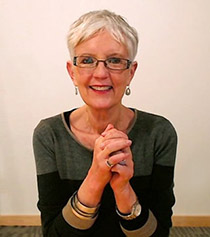Strategies to Treat Patients Trapped in the Freeze Response
 |
with Bessel van der Kolk, MD;
|
 |
with Bessel van der Kolk, MD; Stephen Porges, PhD; Ruth Lanius, MD, PhD; Pat Ogden, PhD; Thema Bryant-Davis, PhD; Bethany Brand, PhD; Deb Dana, LCSW; Janina Fisher, PhD; Kathy Steele, MN, CS; Ruth Buczynski, PhD
Sign up for the Gold Package

This is a learning community for practitioners. We can’t wait to hear what you’re going to use with your clients
But please do NOT:
- seek advice for personal problems
- ask for referrals
- post links or advertise a product
- post about technical problems
Thank you very much dear resource personnel for such wonderful inputs, and insights you have shared today. As a trainee counselor, it is very very useful, in my profession. I have learned tips to identify the freezing responses of the clients. I always found it difficult to work with clients who are not responsive and do not give content. From today’s session, I understand that I can work with their body responses in the session to elicit the content or the emotions. Thanks again. Looking forward to the next sessions.
thanks so much… I work with people who are in active addiction and unsheltered in Kensington/ Philadelphia. I do art-as-harm reduction and art-as-wellness support. This series is terrific and gives me insight & tools to apply with folks experiencing trauma.
Kathryn Pannepacker
Artist/Uplifter
Excellent information and I will definitely add more visual items and soft cushions etc to my office!
Thank you so very much for offering this very insightful and practical presentation on working within the Freeze response. The speakers are very knowledgeable and demonstrated their expertise as well as true understanding and compassion for the individuals who are impacted by this freeze response. Thanks again, looking forward to part 2.
Thank you for this master class🙏. The structure, the duration and the content worked very well. I’m thankful for your mission, and sharing the knowledge and experience so we can do a good job. I loved the practical interventions and experience every day the importance of (re)connecting with the body and the here and now. Looking forward to next week.
Fascinating about deep pressure- as Early Childhood Intervention, we noticed kids with Sensory Integration Processing Disorders often sought out deep pressure by climbing into very small spaces, squeezing into boxes, cabinets,etc. Also Dr. Temple Grandin built her own Squeeze Box as a child to calm her nervous system- she had autism and that helped her stay calm and able to focus through college!
Thank you so much, l am taking away very useful information and skills such as grounding methods, what the polyvagal method is about using my regulation to co-regulate. I understand better how the nervous system works and what it needs at the moment. I look forward to the next training session.
Great insights in today’s program. Thank you so much all for sharing. I have been practicing some of them and some pointers here were helpful. Look forward to the upcoming trainings as well.
Hello all! I am a healthcare chaplain working through my own trauma as a frontline worker during COVID, concurrently called into constant traumatic situations with patients, families and especially staff right now. This first module was very helpful and I am looking forward to all the rest. THANK YOU for making these available for free at a helpful range of hours. Many of us in the helping professions are indeed unable to invest in this caliber of continuing education on a regular basis and at regular times. I am grateful and encouraged by what you are doing!
I will contionue to use them as I allready am. But wow it feels good to get validation and to refresh my knowledge. Sometimes I feel like I am doing to little and thats when I do to much. Trauma is tricky like that, less is more in many cases.
The acknowledgement of the therapist’s own freeze is huge- the more we recognize this in us the quicker we can re-center ourselves to be there for the client who went into freeze
As a Speech-Language Pathologist, I am grateful for the info about how our tone of voice can affect our clients.
sometimes, as a therapist, I’m afraid to directly address a patient’s freeze response because I don’t want to retraumatize them, or push them into a deeper state of isolation. this gave me specific examples of tools to identify and address the freeze response skillfully, and even to use it to the client’s advantage. thanks!
Thank you so much for this wonderful collection of wisdom, knowlegde and sharing. I also appreciate the time to reflect on my own clients – excellent connection to the here and now! Best wishes, Nicole (@nicyogini)
I am so thankful that trainings like this are available for free!! I am a student already paying for school so having this available to me is very encouraging. I cannot wait to practice these skills and begin to identify the freeze response. I feel more confident as I am beginning my practice of psychotherapy. This was truly a fantastic beginning and I look forward to the other webinars in the weeks to come. Thank you so much!
I will look for additional freeze responses in evaluating and treating clients with immigration cases.
This was an excellent presentation.
Exceeded my expectations. Very practical, useful, relevant! Thank you.
Is there something clients can do themselves when they are in a freezing status? So without the therapist when they are alone and notice themself they are freezed. Thanks, Corinne
I am glad to know that some of what I’ve learnt are trauma sensitive. This gives me confidence to continue
I really like the examples of practicing “freeze” and developing a plan for what may work for them when it happens in real life. I think this will work well with my younger clients especially!
Seeing the freeze response as positively helpful to the client at the time it was first generated gives power back to the client. They took charge. Useful to reinforce this with my clients
I don’t quite know how to say how significant this hour has been for my training and practice so I will just say thank you
Paula LCSW
Maine
Fantastic, straightforward, clear but very information-rich session that delivered on multiple levels. Deeply appreciate all the work that went into creating it, and of course your sharing it with us all.
Such a great teaching event. Teachable moments brought to the forefront as examples. Review and recaps done well. Thanks so much!
Thank you very much for making the videos available and being a part of us helping others around the world. Much gratitude.
Thank you so much! I learned so many things of what and how to do with my pupils when in freeze mode!
I will use what Ive learned to have the confidence to move forward with the grounding and somatic awareness work included in my workshops.
Thanks, very clear and usefull.
Thankyou for making this freely available it the time of broadcast. I’m looking for something to help myself, and I’m very grateful you made.thus available.
Please can we have subtitles I am deaf and some of the speakers were not clear communicators. Thank you.
As a trainee psychotherapist I found this really interesting and insightful.
Thank you for making this available for free.
Thank you for an inspiring and thoughtful presentation.
This was excellent!!
Very interesting discussion. As a survivor of emotional abuse, I think it’s essential to understand that a minor miscue or rupture between the therapist and the client can occasion a freeze response. Consequently, remember that, in that experience, the therapist themselves can appear terrifying to the client. It’s not just a response that occurs in a vacuum, solely linked to past trauma, with no connection to the present context.
There is an incredibly helpful table that lays out how different ruptures in therapy can lead to a triggered response in a client – ‘Treating Adult Survivors of Childhood Emotional Abuse and Neglect: Component-Based Psychotherapy”, Hopper et al, pg. 96. As the authors of this incredible book note, “Despite the proliferation of nearly 100 evidence-based or promising treatment models tailored to survivors of other forms of trauma designed to target particular posttraumatic symptoms or disorders, until now none have been specifically developed to treat adult or even child survivors of psychological maltreatment.” (p.6)
As a survivor of emotional abuse and neglect, who has done thousands of hours of therapy with different therapists, this book is the first one that actually speaks to my experience in and outside of therapy. If you are a therapist who works with clients who were psychologically maltreated, please read it.
Thank you Will Franko for your comments and sharing of your experience above and the book reference. This was so apt as a client was speaking today about this very experience that she had with her counsellor. Christine (Somatic Experience Practitioner and Integrated body worker)
Thank you so much for this Master class. I love the format – the way you have edited the thoughts/contributions of all the Masters and then the summaries by Ruth. The practical intertwined with the theory really helps the info to resonate for me. Thank you so much!
Thank you so much, this information is really practical and helpful. I found it really interesting that “Empathy could be contraindicated when your patient’s fear and arousal is too high”. As this is my usual go to when my clients are really distressed. It makes sense use matter of fact grounding language to help them regulate their systems. As a therapist who only has a few years experience I definitely feel better equipped to work with trauma after listening to this podcast.
Yes, empathy can sometimes come across as forced or insincere, throwing the client into a defensive mode. Also, asking permission is a very potent salve.
Trauma Survivor
Today’s session gave me great practical ideas, which is wonderful for a practitioner! Thank you.
Very useful strategies. Thank you so much. I’m now thinking about having interesting, soft objects in my room so that client can orient visually to /or anchor themselves to when they need to.
This helps me to refine the skills I am already using. In particular, the use of my own voice to help contain the arousal I’m noticing in the client by using other suggested methods which speak to their nervous system when overwhelmed. Thank you!
I really enjoyed this presentation. I had never considered working with an oxymeter before! I’ll definitely start implementing that with my clients. Thank you for putting this amazing group of people together!
Thank you. I am a clinician working in a residential treatment facility for adults with serious mental illnesses. I see a lot of what you describe here re the freezing response, but have not had the tools to help someone through the experience. I feel encouraged and have a great deal of grateful for this series. Thank you.
I found this really useful, breaking down the stages and using the PDF gives me a quick recap and a means to focus on how to use this with my clients. I used DBR today with one client, picking up the neck tension just before the trauma was experienced which was reinforced by Pat Ogden, the body gives us the information without a commentary. The client didn’t tell me in detail what she processed but the mismatch/shift she discovered through tracking the feelings in her body related to the abuse/trauma gave her hope, she felt brave and courageous instead of ‘just a survivor’ looking forward to the next session. We used breathwork throughout to avoid overwhelm, so interesting and useful listening to these specialists.
I plan to use the breath work, micro movements, and eye movements. I also loved the 4 step process to regulating the freeze response: rewind, pivot from memories into movement, execute action, and savor to effect.
Thank you so much for this series – many of my clients are referred to me at a point they are experiencing complex grief. Viewing the freeze response as having served the client is a very useful (re-)framing. I am looking forward to the future presentations.
Enriching session. Learnt many new ways by which i can handle patients with trauma..like bio feedback with oximeter or asking to look right and then left, how deep pressure can help. The concept of not touching the patient with deep trauma was also an important take away! looking forward to join the next sessions!!
That was an amazing webinar. I feel so inspired and motivated to use the helpful cues and ideas i´ve heard today from these amazing skillful women. Thank you so much.
Frances Holmes, Functional Nutritionist, Integrative Grief Practitioner ~ Thank you SO much! This was beautifully done! Can’t wait for the next one. Today I will be more observant and aware of myself and those I encounter! SO appreciate all of you and your work! Thank you again!
Thank you that first session was fantastic and so important for us all to understand.The session helped me re-affirm the work I am doing and that I’m on the right track. I will be taking some of the thinking around pressure back into my sessions with children who have been sexually abused.
Very helpful. Reinforced some of what I knew, added to what I know and reminded me of some of what I had forgotten.
Thank you
Thank you very much for this wonderful training. It is so clear, intense (full of information), interesting and it kept me so focused all the time. I enjoyed it so much!